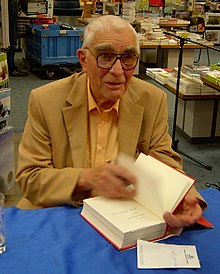Ernst Schumacher
Ernst Schumacher (born September 12, 1921 in Urspring , Bavaria ; † June 7, 2012 in Schwerin near Teupitz , Brandenburg ) was a German theater scholar and critic .
Life
After attending the Humanist High School in Kempten , Ernst Schumacher served in the war from 1940 to 1943 and was seriously wounded on the Eastern Front. He then studied German and theater studies at the University of Munich . There he met his first wife Rosa Hillebrand (1919–2013).
For his doctorate , Ernst Schumacher asked Bertolt Brecht in a letter on July 7, 1947 to let him do the exile work, but received no answer. In 1949 Schumacher met Brecht personally in Berlin. Since he found no interest in the topic in Munich, Ernst Schumacher received his doctorate in 1953 at the University of Leipzig with Hans Mayer , Ernst Bloch and Ernst Engelberg on Bertolt Brecht's dramatic attempts 1918–1933 .
Schumacher had been a member of the KPD since 1949 and worked as a South Bavaria correspondent for the German broadcaster of the GDR. Due to a criminal complaint for "intelligence agent activity" he was in custody in March 1953 in the Stadelheim correctional facility ; his Stadelheim diary , which he wrote during this time, was published in 2007. In 1956, during a trip to Asia, Schumacher was the first Western writer to interview Chinese Prime Minister Zhou Enlai and later Hồ Chí Minh in Vietnam .
In 1962, Ernst Schumacher moved to the GDR and completed his habilitation in 1965 at the Karl Marx University in Leipzig. From 1969 to 1986 Schumacher was head of the chair of the theory of the performing arts at the Institute for Theater Studies at Humboldt University . His best-known student is Frank Castorf , long-time director of the Volksbühne in Berlin.
After his retirement in 1987, Schumacher continued to work as a theater critic and wrote for the Berliner Zeitung and Friday , among others .
After the fall of the Wall in the GDR , Ernst Schumacher was selected from the Berlin Academy of the Arts , which he felt was a deep offense. As a gesture of reconciliation, his bequest was added to the holdings of the Academy in 2003. He was a member of the PEN Center Germany .
He is buried in the cemetery of the Dorotheenstadt and Friedrichswerder communities in Berlin-Mitte.
Fonts
- Bertolt Brecht's dramatic attempts 1918–1933 . Rütten & Loening, Berlin (East) 1955. (Dissertation University of Leipzig, 1953)
- Theater of time - time of the theater. Thalia in her fifties . Dobbeck, Munich 1960.
- The case of Galileo. The drama of science . VEB Dt. Verl. D. Sciences, Berlin (East) 1964. (West German edition Darmstadt: Progress-Verl. Fladung, 1964.)
- With Renate Schumacher: Life of Brecht in words and pictures . Henschel, Berlin (East) 1978. (The West German edition was published by Suhrkamp.)
- My Brecht. Memories 1943 to 1956 . Henschel Verlag, Berlin 2006, ISBN 978-3-89487-534-3 .
- Michael Schwartz (Ed.): Ernst Schumacher - A Bavarian Communist in double Germany. Notes by the Brecht researcher and theater critic in the GDR 1945–1991. Oldenbourg Wissenschaftsverlag, Munich 2007, ISBN 978-3-486-58361-8 .
literature
- Aune Renk: Schumacher, Ernst . In: Who was who in the GDR? 5th edition. Volume 2. Ch. Links, Berlin 2010, ISBN 978-3-86153-561-4 .
- Ernst Schumacher. Diaries 1992-2011 . ed. by Frank Hörnigk, Theater der Zeit, Berlin 2012, ISBN 978-3-94388-119-6 .
Awards
- 1971: Goethe Prize of the City of Berlin
- 1975: Patriotic Order of Merit in bronze
- 1976: Lessing Prize of the GDR
- 1981: Patriotic Order of Merit in Silver
- 1986: National Prize of the GDR III. Science and technology class
Web links
- Literature by and about Ernst Schumacher in the catalog of the German National Library
- "The master and the Munich boy" . Ernst Schumacher on his encounters with Brecht and Thomas Mann. In: Berliner Zeitung , Magazin, February 11, 2006. (Excerpt from Mein Brecht )
- Ernst Schumacher: “The broken monopoly of the stage. A contribution to the debate on theater studies at the Humboldt University ” , in: Berliner Zeitung , June 28, 2000.
- Holger Teschke: “Calendar Stories from the Cold War” . Review of Mein Brecht . In: Berliner Zeitung , March 2, 2006.
- Ulrich Seidler: “On the trail of the apocalyptic animal” . Ernst Schumacher on his 85th birthday. In: Berliner Zeitung , September 12, 2006.
- Ernst Schumacher: "Who divided Germany?" In: Ossietzky , April 5, 2008.
- Henryk Goldberg : Ernst Schumacher 1921 - 2012 , obituary in the weekly newspaper der Freitag from 23 June 2012
- Ernst Schumacher Archive in the Archive of the Academy of Arts, Berlin
- Ernst Schumacher in the Bavarian literature portal (project of the Bavarian State Library )
Individual evidence
- ^ Frank Hörnigk: On Brecht's Trail . In: Berliner Zeitung . June 8, 2012.
- ↑ a b Commission for Bavarian State History (PDF; 8 kB), accessed on October 7, 2012.
| personal data | |
|---|---|
| SURNAME | Schumacher, Ernst |
| BRIEF DESCRIPTION | German theater scholar and theater critic |
| DATE OF BIRTH | September 12, 1921 |
| PLACE OF BIRTH | Origin |
| DATE OF DEATH | June 7, 2012 |
| Place of death | Schwerin (Dahme-Spreewald district) |

